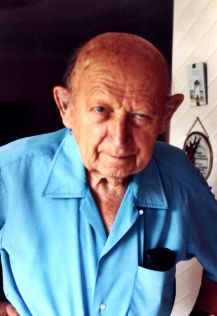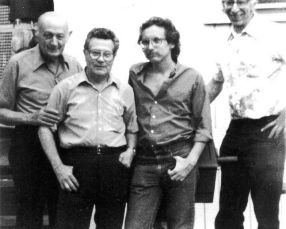
Attilio Bortolotti died of pneumonia on February 10, 1995, in a nursing home near Toronto. He was born on September 19, 1903, in Codroipo, Friuli, Italy, the fifteenth of eighteen children of Luigi Bortolotti, a builder, and Maria Pittana.
Tilio emigrated to Canada in 1920 and became active in the anarchist and antifascist movements in Windsor and Detroit during the agitation for Sacco and Vanzetti. Arrested in Detroit in 1929 for distributing a leaflet announcing a Sacco-Vanzetti meeting, he was held for deportation to Italy, but jumped bail and fled to Toronto. There he worked as a tool-and-die maker and resumed his anarchist activities, editing Il Libertario from 1933 to 1935 and The Libertarian in 1968 and 1969.
In 1934, Bortolotti met Emma Goldman, who was living at the time in Toronto, and the two became close friends. In 1939, when Bortolotti was threatened with deportation—and certain death at the hands of Mussolini—Emma immediately took up the fight, securing an attorney and raising funds for her comrade’s defense. Bortolotti, she said, was “one of the biggest men we have in our movement, intellectually and morally, besides being a tremendous worker. He is like so many of the Spanish comrades. He lives for nothing else but for his ideal.”
Emma’s campaign was successful, and Bortolotti was set free. A month later, however, Emma suffered a stroke, from which she died on May 14, 1940. The Bortolotti case had been her last battle against the state.
—Paul Avrich
We at the Fifth Estate dedicate this issue to our comrade, Attilio Bortolotti. Tilio was also known as Art Bartell to his many friends and to the projects he so generously supported. His disdain for governments and religion and his hatred of war began at an early age and continued throughout his life. Even when working in Detroit and Windsor auto factories, he tirelessly promoted his anarchist ideal.
Tilio was a pamphleteer, soapbox orator, organizer of anarchist theater presentations and initiated many cenas (dinners) where he and his comrades raised untold sums throughout the years for “the publications and the political victims.”
Tilio’s life spanned almost the entire century, and his political work intersected with the major events of the times. His insistence on international solidarity and relentless pursuit of “the Ideal” is a tradition of which we feel a part and hope to continue this lineage of revolt into the next century.
We mourn the loss of our friend and comrade even as we realize that his life, filled with devotion to the cause of anarchism, was as rich as one can have.
We send our heartfelt condolences to his companion Libera and his son Libero.

